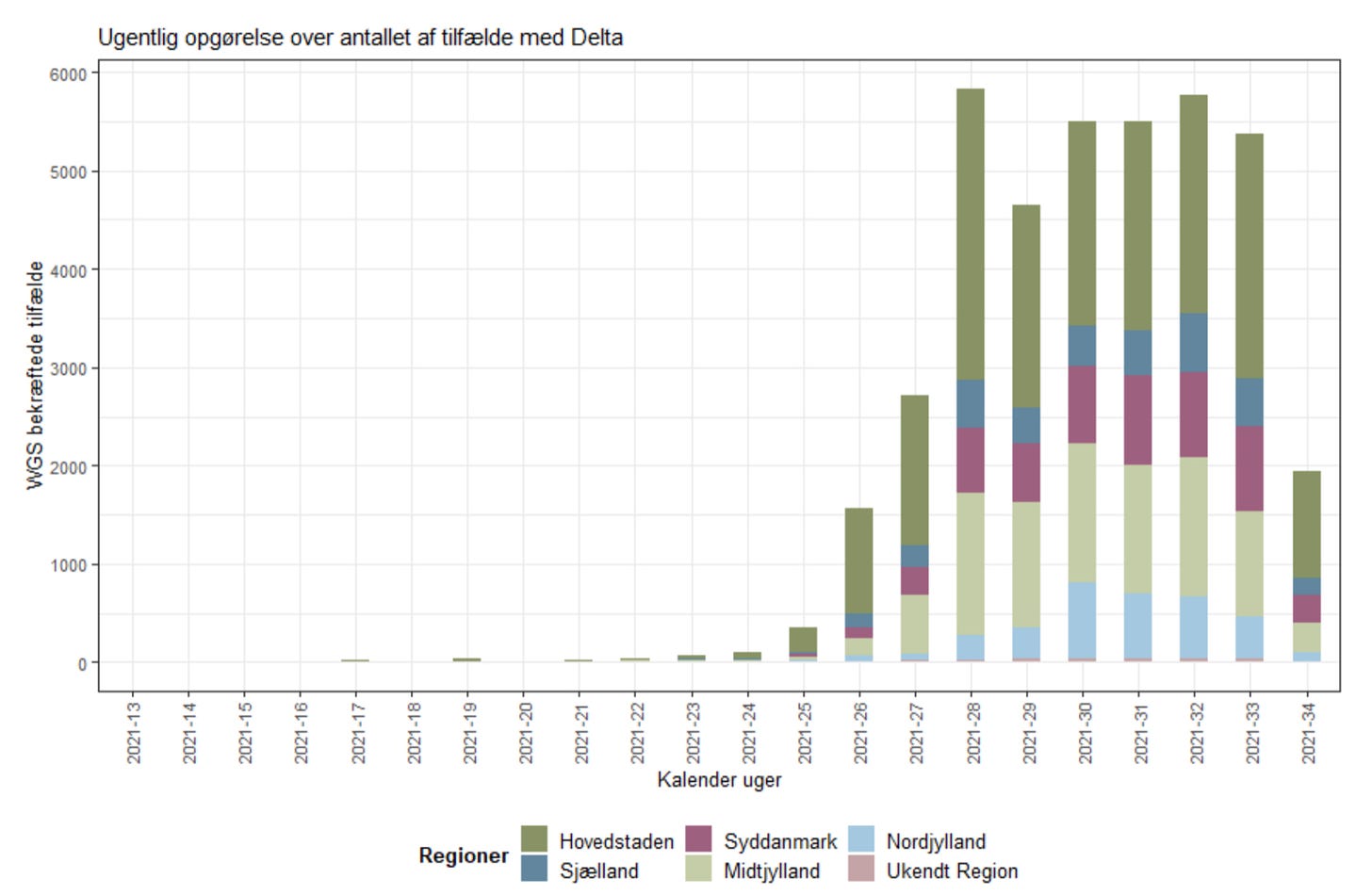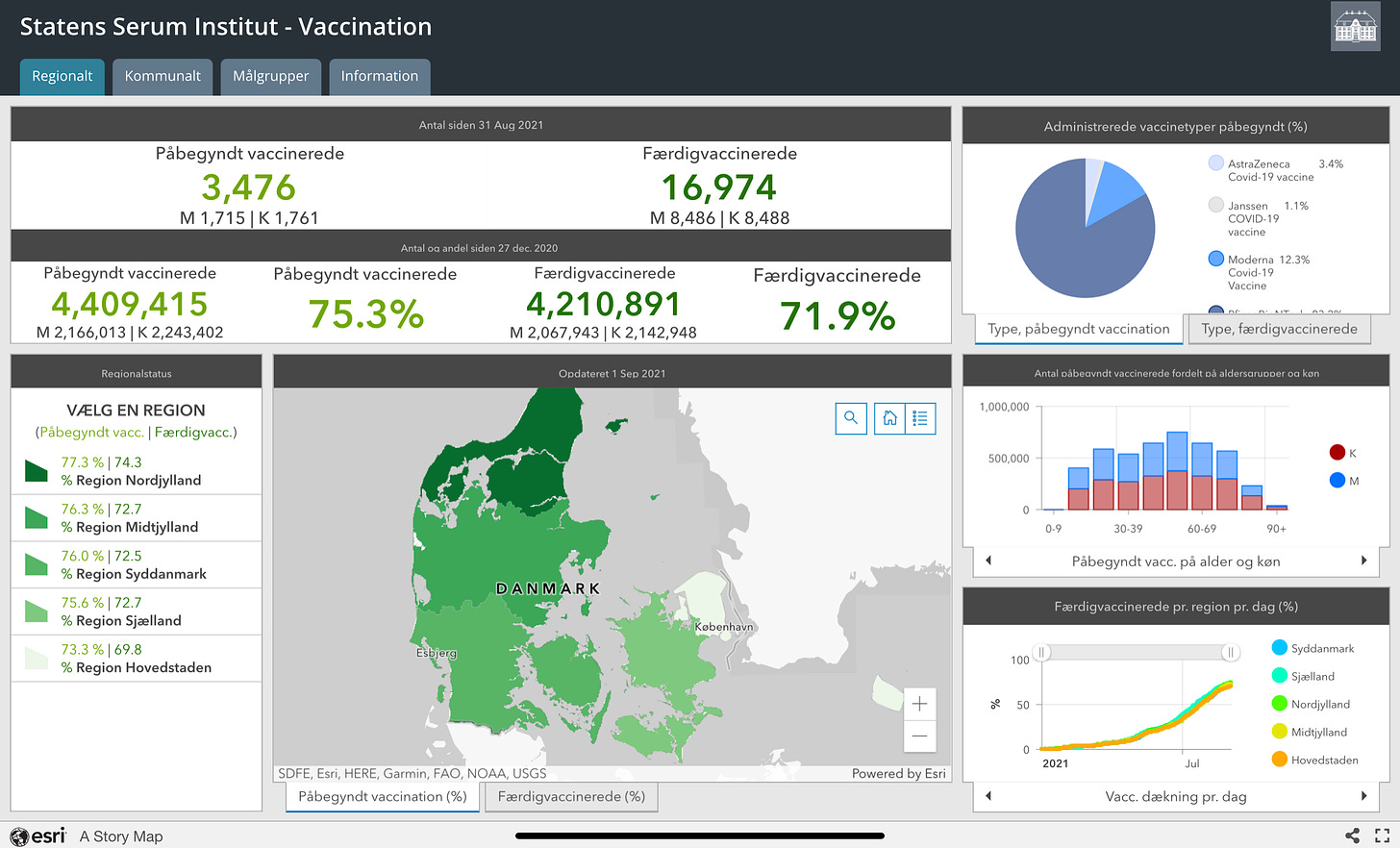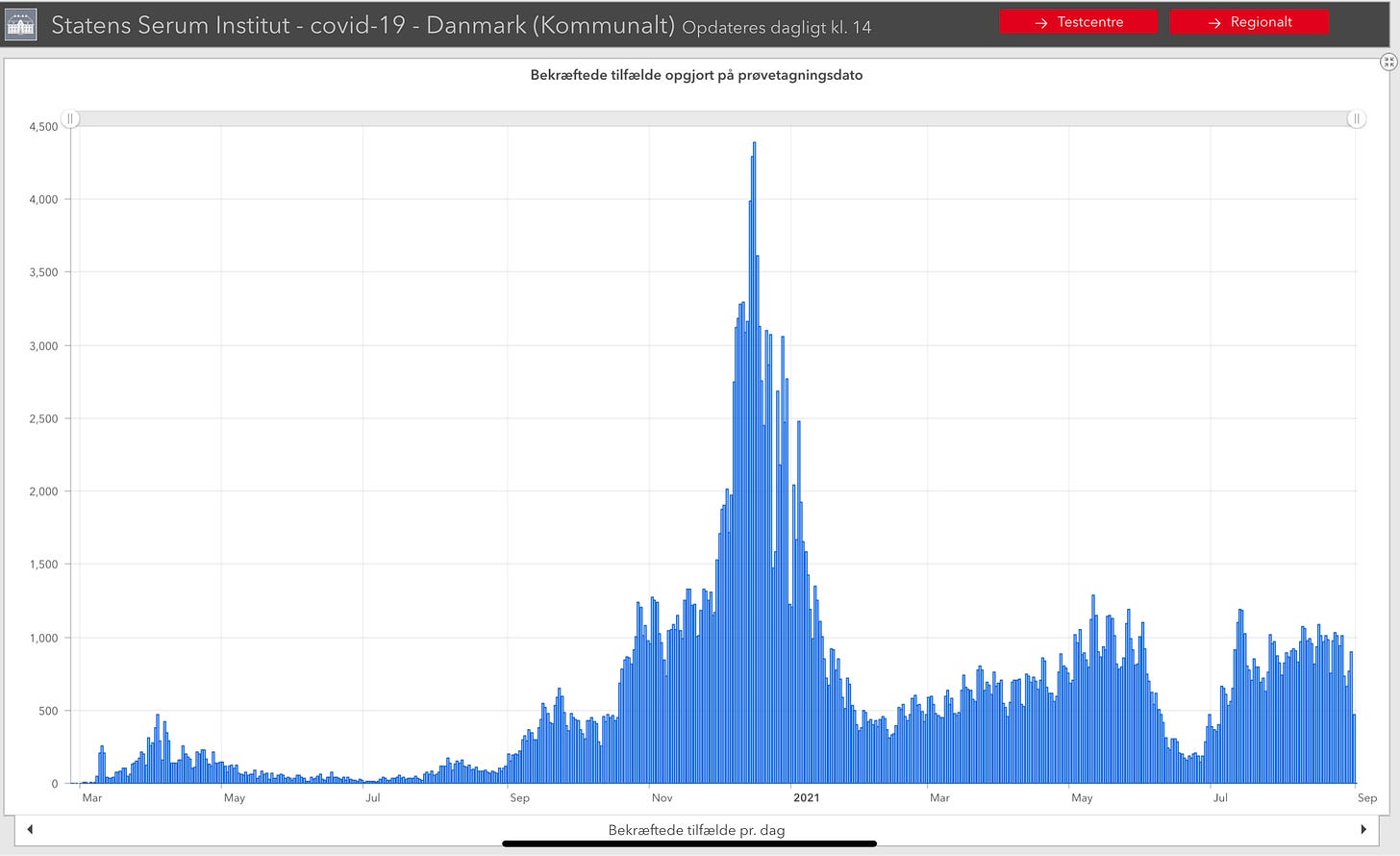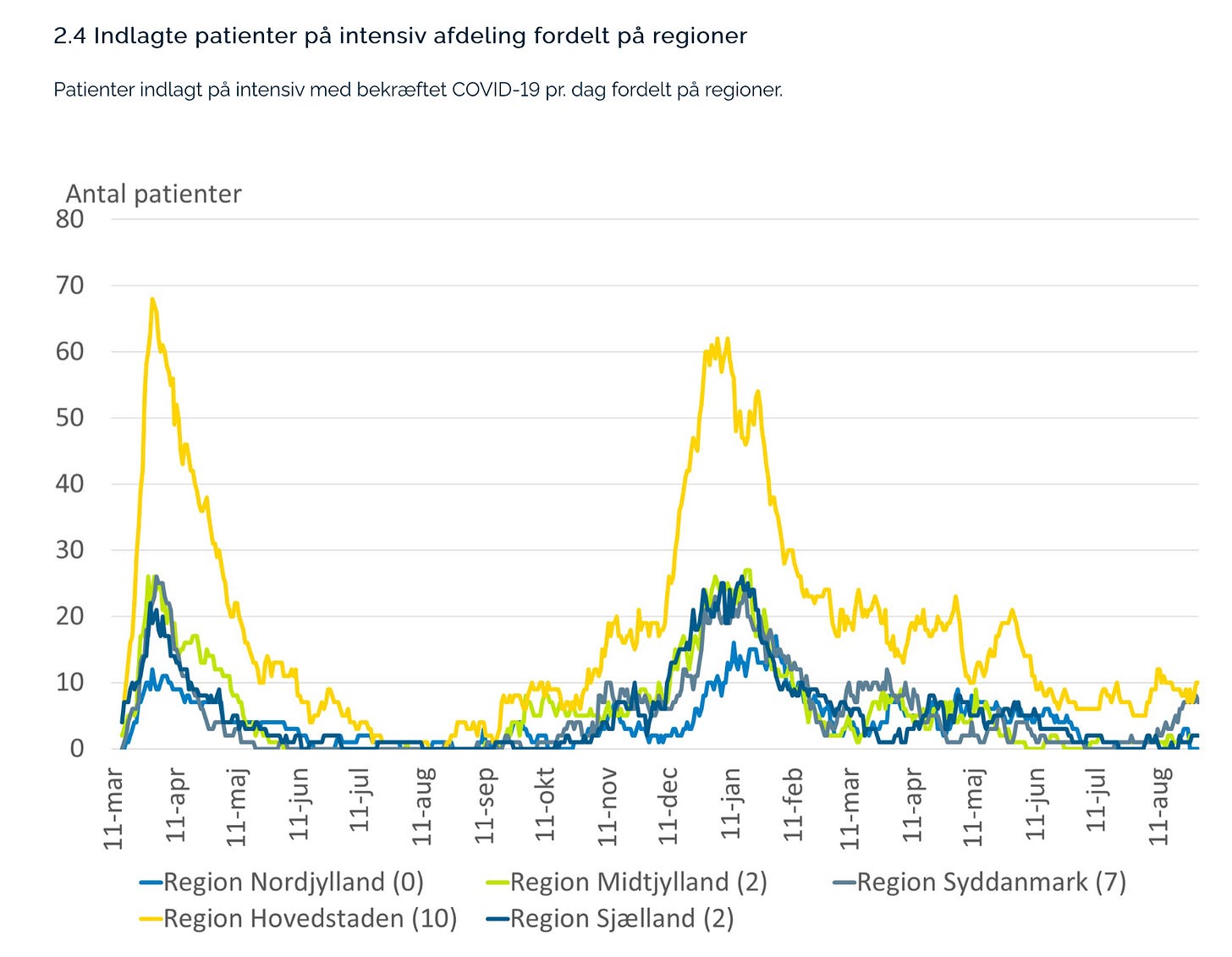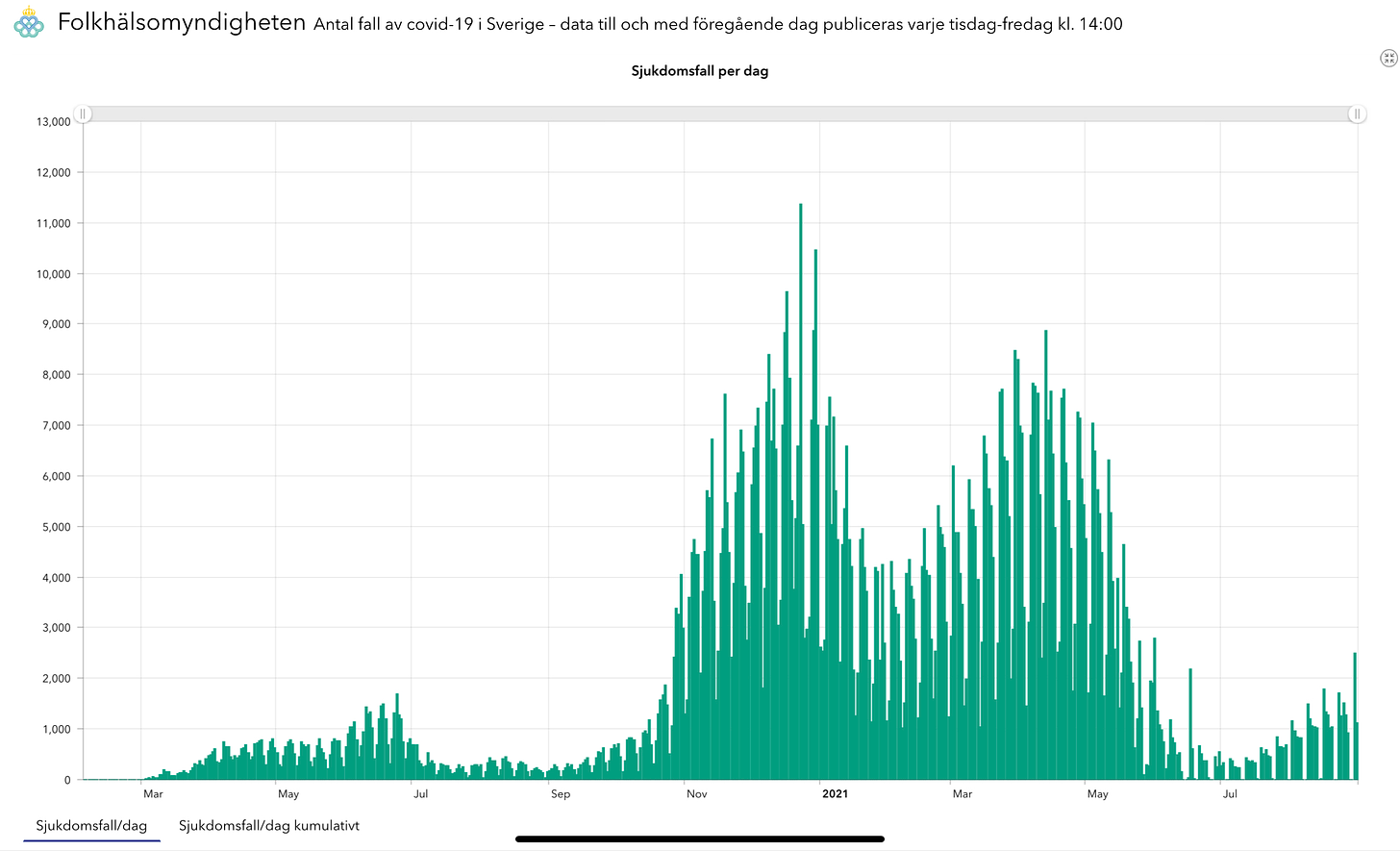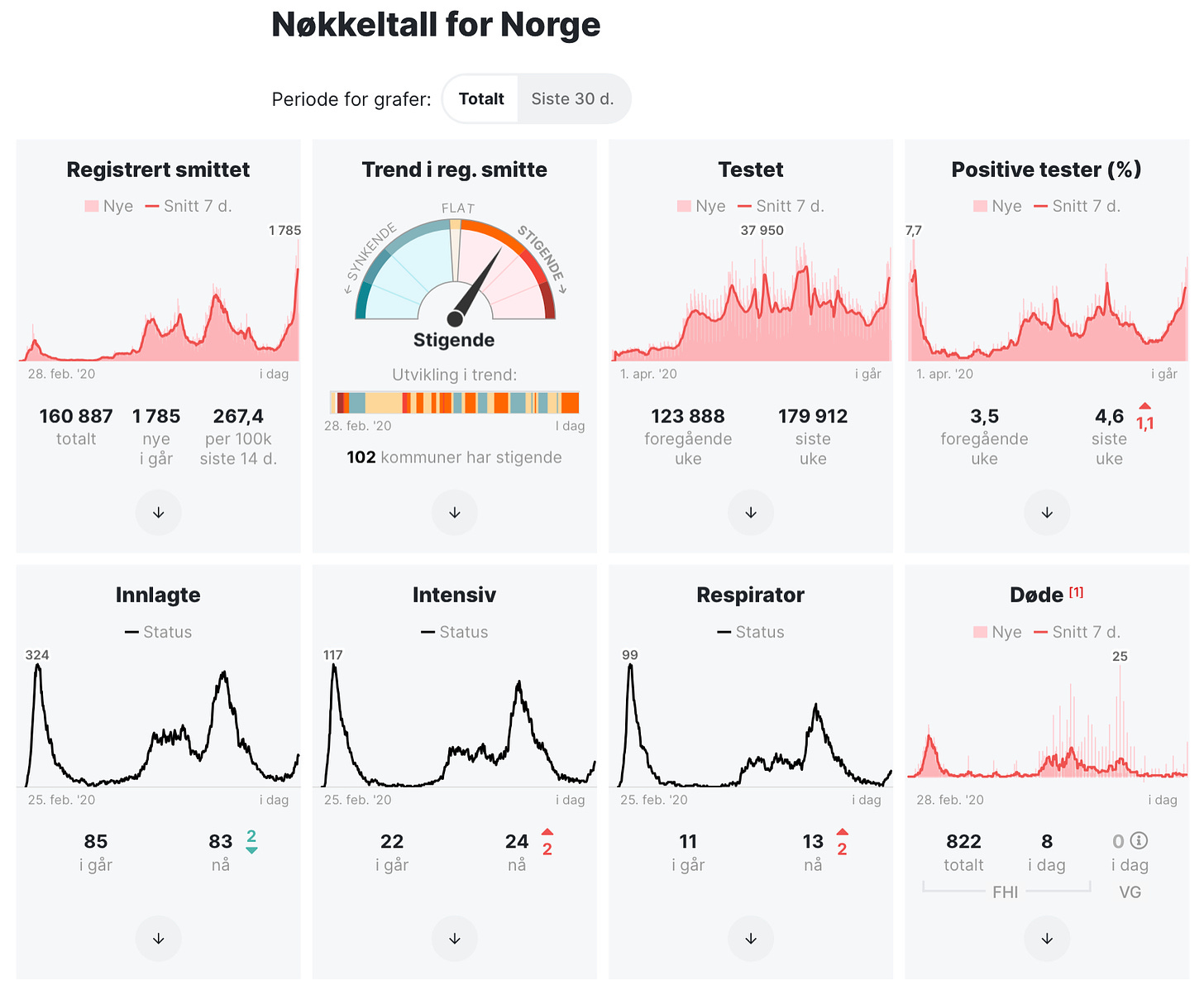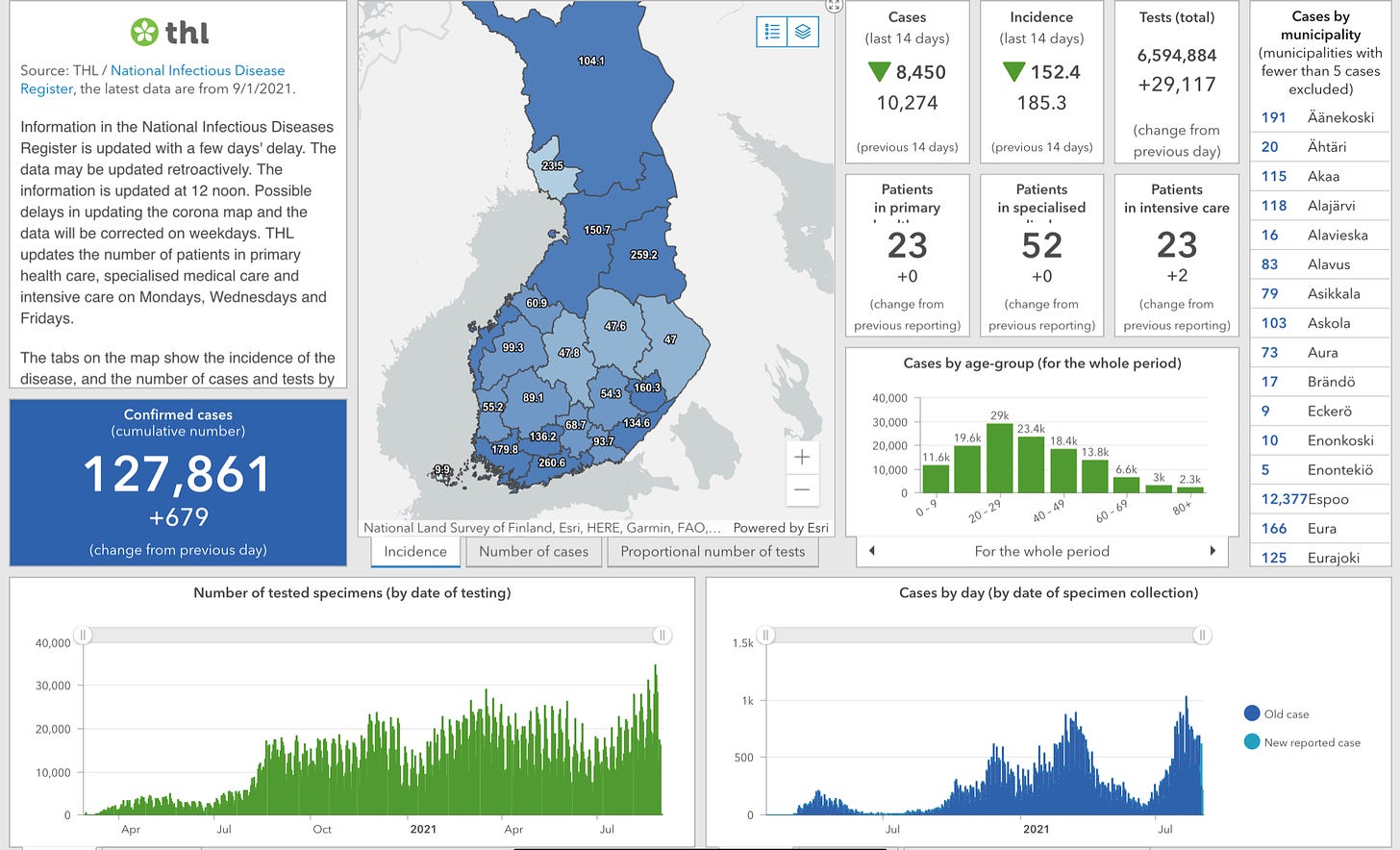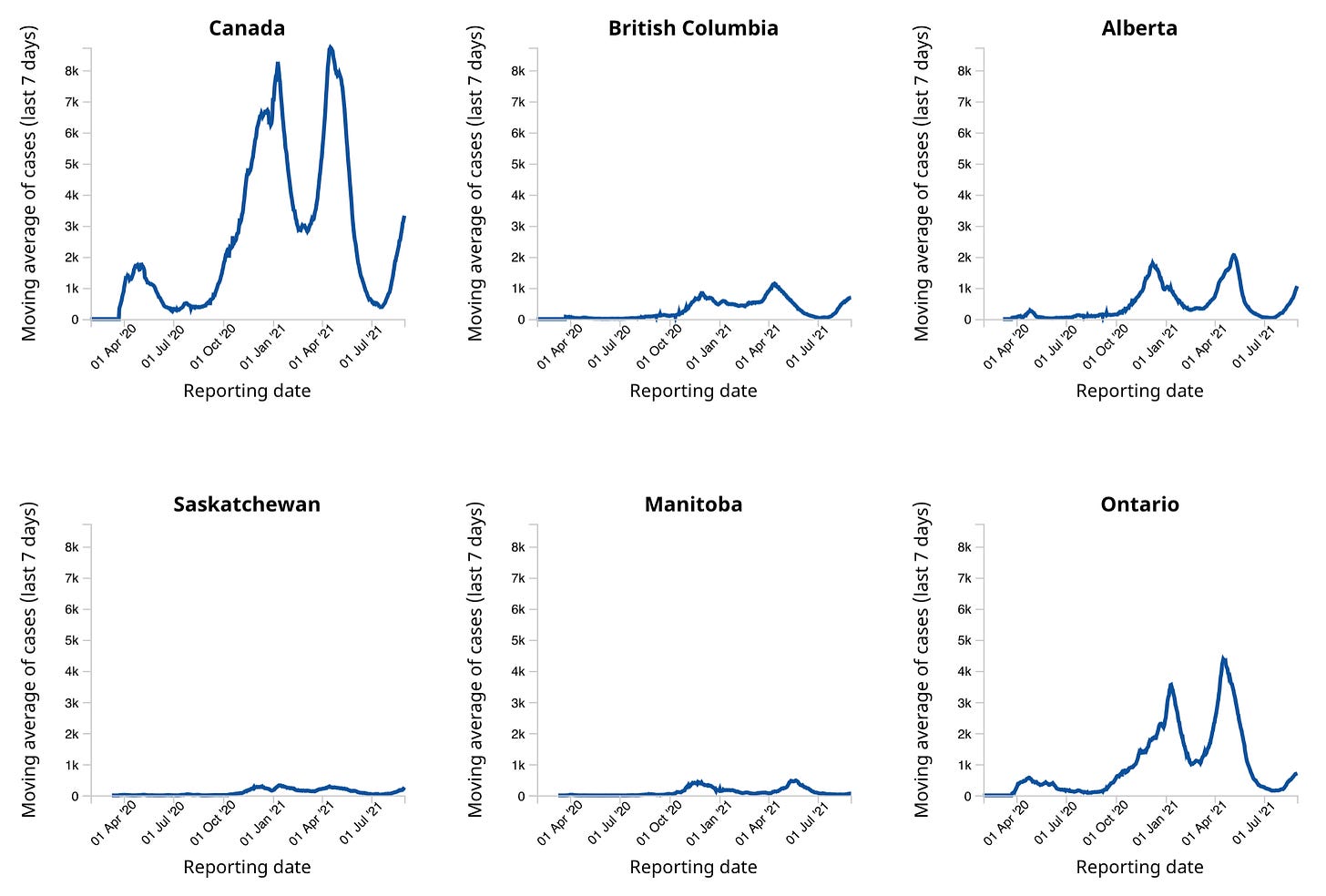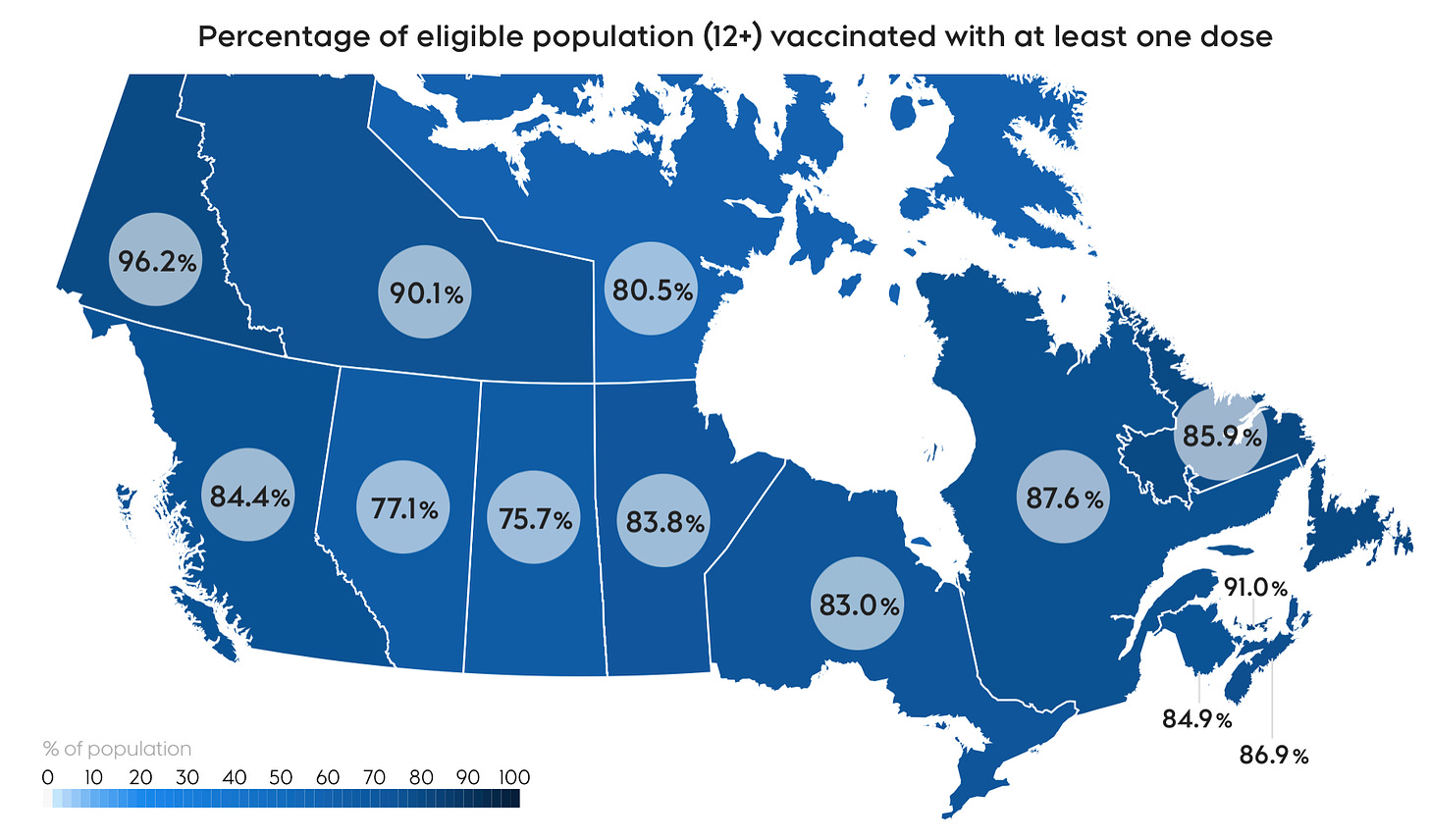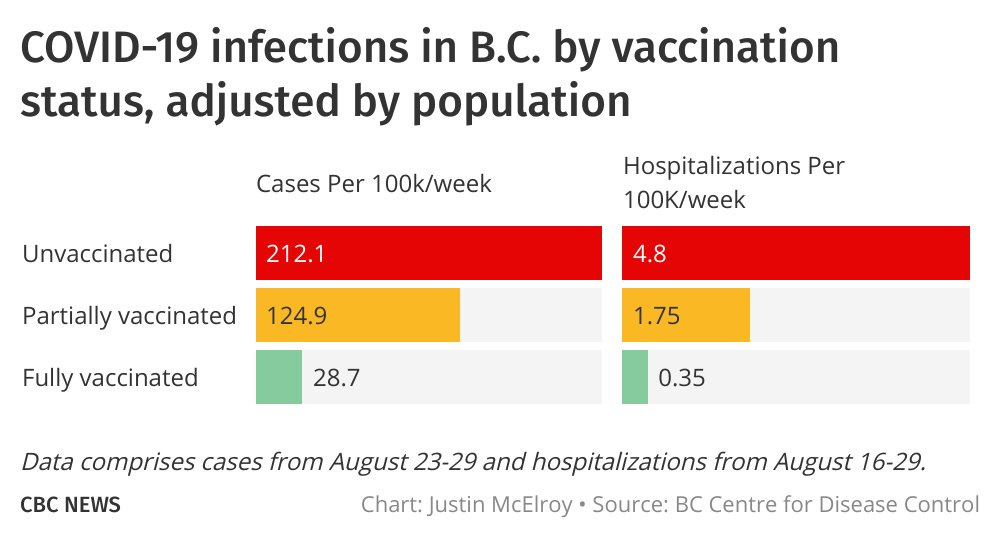🇩🇰
It is September 1, meaning as of today number of COVID restrictions have been lifted as Denmark takes the second to last step in a full return to near-normal. The last step happens on September 10, when the few restrictions that remain will be wiped away.
The following restrictions are no longer in effect as of today.
All remaining assembly bans are rescinded.
All remaining restrictions on restaurant opening hours, alcohol sales, and indoor social distancing is abolished.
Discos, nightclubs, and other nightlife venues can reopen. A coronapas is required to enter but no other restrictions apply. The coronapas requirement will be lifted on September 10.
All requirements for hand sanitizer and COVID signage for retail and all other indoor areas is lifted.
Retail and grocery stores 2,000 m2 and larger can remove all caps on the number of customers allowed inside.
Coronapas requirements largely come to an end except for nightlife venues and some indoor and outdoor events.
All testing requirements for physically being at work and for those whom work in a daycare is rescinded EXCEPT for anyone who is not vaccinated.
-
The Danish Health Ministry says as of today kommunes and parishes no longer have to automatically lockdown after triggering certain infection benchmarks. The automatic shutdown model has been rescinded as of today.
In the release, the ministry waved a pretty big warning flag.
“The epidemic in Denmark is well under control, which is partly due to a high vaccine supply. However, in the autumn and winter, an increase in COVID infections is expected among the non-vaccinated, especially among children and adolescents who are not covered by the current vaccine program. With a large spread of infection among children, it will be possible to spread the infection to other unvaccinated age groups.”
Health Minister Magnus Heunicke says kommunes will have access to a “toolbox of recommendations” to monitor infection activity and control measures. He says the municipalities will work with the Danish Agency for Patient Safety, which retains the power to order a kommune or parish to lockdown should infections explode.
The ministry emphasizes the infection prevention measures “are aimed at primary schools and day care centers, where there is expected to be a spread of infection in the autumn and winter.”
“We have now reached the point where we can remove the automatic shutdown model. We continue to monitor infection activity at the parish and municipal level, because corona is still here. The health authorities continue to make guidance and efforts available to the municipalities so that they have the necessary tools if the infection increases. That way, we can keep the infection down and the community open. Should there be new developments that threaten epidemic control, then the government is ready to take action again with the measures needed to get the infection under control.”
Among the infection control measures are recommendations to comply with ministry of health COVID guidelines. Children in daycare, primary schools, and SFO should stay within their own groups. All dropping off and picking up of kids should be done outside. The ministry also recommends twice-weekly COVId testing for children 12 years old and older who are not vaccinated.
-
Delta remains king in Denmark. For a fourth straight week, the COVID variant was so dominant that no other coronavirus strain had been detected in Denmark. In the last week, there have been another 1,898 confirmed Delta variant cases pushing the total so far to 39,501.
-
On the vaccination front to date, 1st dose vaccinations cover 75.3% of the total population and 71.9% are totally vaccinated.
Yesterday, there were 20,450 total inoculations done and of those 3,476 were 1st doses.
-
Denmark is reporting 825 COVID infections and no new coronavirus deaths in the last day.
Yesterday, there were 136,238 total corona tests down, 63,839 PCR and 72,399 rapid, for a (PCR only) positivity percentage of 1.29%.
-
COVID hospitalizations (134) dropped (-13) while the number of people in an ICU (25) went up (+4) and of those the number on a ventilator (15) also edged upward (+2).
-
Health Minister Magnus Heunicke says Denmark has secured 2.5 million doses of the influenza vaccine as it tries to head off a possible twindemic. Heunicke says after almost two years of virtually no influenza season due to COVID restrictions, the flu season this fall and winter could be “extra tough.”
Beginning in October, Denmark will offer free flu shots to healthcare staff, seniors over 65, vulnerable populations, and, for the first time in Denmark, children between two and six years old. For children, the vaccine will be administered as a nasal spray and not via a needle. Heunicke says this is “expected to be able to significantly reduce influenza infection in children and prevent illness in families.”
He also revealed that seniors over the age of 85 will get a “high dose” flu vaccine. Also, very obese people with a body mass index of 35 to 40 are also recommended to get a flu shot.
🇩🇰 🇸🇪 🚊🇪🇺
In non-COVID news frustrations are growing in Sweden and Denmark over roadblocks in getting overnight trains operating to destinations out of the Nordics to elsewhere in Europe. Danish Transportation Minister Benny Engelbrecht says German regulations are choking off every effort to get night trains running out of Denmark or Sweden to other European destinations. The situation is such a mess that nobody even bothered to bid on a proposal for a night train between Malmö and Brussels.
“The night train is and will be a good and green alternative to the long car journey or short flight in Europe. We have a common European challenge in creating a good framework for night train operations. For example, according to German rules, it is not possible to support train journeys over 50 kilometers. I will discuss the possibility of removing this obstacle with my European colleagues at the next opportunity.”
Engelbrecht is clearly frustrated and says he has reached out to his Swedish counterpart so they can present a united front on the issue.
🇸🇪
Sweden has added 1,104 infections and had no new corona deaths since yesterday’s update.
There are 44 people being treated in intensive care units across Sweden.
On COVID vaccinations…
Adult population 18 years old and older - 6,718,360 1st vaccine doses (82.0%) and 5,767,107 2nd doses (70.4%) have been administered.
16-17-year-olds - 193,266 1st doses done (55.0%) and 20,910 teens (5.9%) had both doses.
-
A Swedish health region wants to make being vaccinated a condition of employment. The Dalarna Region’s personnel committee decided at its most recent meeting to investigate the matter.
Regional Councilor, and Chair of the Personnel Committee, Ulf Berg, says this is about patient safety.
“As a care provider, we must do everything in our power to prevent the spread of infection. The right as an employer to opt out of jobseekers who do not want to be vaccinated must be possible. Therefore, we have decided that the issue should be investigated.”
The regional director will now consult with the region’s legal department and infection control unit. Findings will come back at a meeting scheduled for January 26, 2022.
-
In Sweden’s Västra Götaland region COVID cases have increased for a seventh straight week. As seen in some other areas of Sweden, the region is seeing the biggest infection growth among those aged 10 to 19 years old. The region says extra efforts need to be made to increase vaccination numbers for those 16 years old and up.
The pandemic of the unvaccinated is being reflected in Sweden’s latest coronavirus wave. Statistics for June and July found about 73% of those who were admitted to hospital for coronavirus infections were unvaccinated. For those in an ICU, that number rises to 92%.
Acting Director of Health and Medical Care Jan Kilhamn:
“Those affected are younger now, they are unvaccinated, and a very high proportion are men, about 70 percent.”
🇳🇴
Norway added 1,629 infections and eight more corona deaths as it saw a record high number of daily infections yesterday.
COVID hospitalizations (83) are down (-2) ICU (24) and ventilator numbers (13) are both up (+2 each).
To date, 71.69% of Norwegians have had one vaccine dose and 57.27% have had both.
-
The Norwegian Public Health Institute says children are much less likely to suffer serious COVID infections, be hospitalized, or suffer from long-COVID. The institute studied data both within Norway and other international studies to arrive at the assessment. That said, its modeling for calculating the number of kids who might be hospitalized in the future is uncertain “but estimates are low.”
Data from Norway show just 0.4% of children 17 years old and younger have been infected and admitted to hospital so far in the pandemic. Those with underlying health conditions were more at risk. The average hospital stay was just two days, leading the institute to conclude children recover quickly. To date, 140 children have been hospitalized with COVID in Norway.
The health agency says deaths among infected children are extremely rare. It cites studies from the United Kingdom, where there were 25 deaths among children confirmed to be caused by the coronavirus. In 76% of those deaths, the child had a “serious underlying and life-limiting disease.” Norway has seen two COVID-related deaths among children.
Chief Physician Margrethe Greve-Isdahl says it is important to understand coronavirus impacts among children because those under 12 cannot yet be vaccinated.
“We still want to have a certain restrictions, but we accept that some children will get COVID. It is an unfamiliar situation for many, because there have been so few children and young people who have been infected so far. We must constantly assess the proportionality of the measures; Strict measures for a disease that is not so serious for children and adolescents are not proportionate. I understand that parents will be worried. However, it is very important to emphasize that COVID in most cases does not result in a serious infection for children, and that the few children who need hospitalization receive good treatment and there is a good prognosis, even for the most serious cases.”
As for the impacts of long-COVID on children, the largest and most important study is British and was recently published in the journal Lancet. It examined 1,734 children in two age groups (5–11 and 12–17 years old). 77 of the children (4.4%) had symptoms after 28 days, and only 25 (1.8%) had one or more symptoms after 56 days. 98.2% then had no symptoms, and more got better as time went on.
-
Parents in Norway were definitely more stressed out during the first COVID lockdown in March of 2020, but a Norwegian study says overall they bent but did not break. The Norwegian Institute of Public Health teamed with the University of Oslo to use a questionnaire sent to around 1,000 families to measure stress levels, mental health impacts, and on “destructive conflicts” between parents.
Researcher Maren Sand Helland:
“The results indicate that the parent’s stress level increased significantly during the shutdown, but that the first shutdown had no severe negative effect on the parents' mental health or led to worsening conflicts between them.”
The study found that parents were generally resilient regardless of income level, geographic location, or children’s age.
The study also found that support services for children facing challenges also closed during the lockdown, exacerbating an already tough situation for some parents.
🇫🇮
Finland registered 679 infections in the last day.
It has seen 12 virus deaths in the last week.
COVID hospitalizations (97) are down (-2) and ICU numbers (21) have inched down (-1) over the last seven days.
To date, 71.9% of the population has had one vaccine dose and 50.3% are fully vaccinated.
-
Almost 400 people in Finland have filed claims seeking damages due to adverse effects of being vaccinated, according to a report from YLE. Finnish law states people can file for monetary compensation for adverse effects of medicines or vaccines authorized for use in Finland.
The Finnish Mutual Insurance Company, which handles the claims, has rejected just over half of the 176 claims processed so far.
CEO Tiina Hellgren spoke with YLE.
“Compensation has been paid for the typical side effects related to coronavirus vaccines, such as various muscle and joint pains, allergic reactions and swollen lymph nodes. Compensation has also been paid for some other individual reasons, but for data protection reasons these cannot yet be revealed because there are so few cases.”
Hellgren says they are dealing with a handful of claims over AstraZeneca vaccinations.
“Six claims have been made for such blood clots, five of which have been accepted and one case is still pending. There were fewer than five claims in which deaths have occurred, so unfortunately we cannot discuss these cases in public.”
🇫🇷
France is following Denmark and Norway in beginning a booster shot campaign doling out third vaccine doses to a select group of people. France is going to administer booster shots to people with underlying health conditions or who are immuno-compromised. Unlike the Nordic countries, France is also going to open the door for a third shot to all seniors over the age of 65.
French health authorities say at least six months must have passed since getting a second dose before a third can be administered. For those who have had the one shot Johnson & Johnson vaccine France will give a second mRNA shot a minimum of four weeks after the J&J vaccination.
🇪🇺💉
The European Centre for Disease Prevention and Control is waving a caution flag on any efforts to launch a booster shot campaign for the general public. The agency says the clear priority should be getting as many people as possible two vaccine doses, never mind three. The ECDC does make allowances for people with weakened immune systems who could benefit from a third vaccine dose.
“The available evidence at this time regarding ‘real world’ vaccine effectiveness and the duration of protection shows that all vaccines authorised in the European Union or European Economic Area are currently highly protective against COVID related hospitalisation, severe disease, and death, suggesting there is no urgent need for the administration of booster doses of vaccines to fully vaccinated individuals in the general population.”
It says there is still a lot we still don’t know about the longevity of protection offered by two vaccine doses, especially in relation to age, different vaccines, and COVID variants. It says that more information is needed to inform any decision on if booster shots are needed and if they are, when they should be administered.
The ECDC says many countries outside of the EU are also still struggling to administer first and second vaccine doses. It says the priority should be on getting those citizens two doses before we think about getting a third.
🦠🌏
A new COVID variant has appeared. The World Health Organization has dubbed it the ‘Mu’ variant and classified it as a “variant of interest.” In its weekly coronavirus epidemiological report, the WHO said there are indications the Mu variant has mutations enabling it to evade antibodies generated by vaccines or a previous infection. The WHO says the variant has been detected in South America and some European countries.
💉
Pfizer is beginning phase two clinical trials of a new pill it hopes will prevent serious COVID symptoms. Pfizer said today that participants in the trial have been dosed. If clinical trials prove successful, Pfizer would then file for authorization of use to the U.S. Food and Drug Administration.
🇨🇦
Canada has reported 2,909 new infections and another 14 coronavirus deaths yesterday as the infection curve continues to climb.
The Canadian vaccination effort has so far administered 27,969,946 1st vaccine doses (73.46% of the total population) while 25,408,711 people (66.74%) are fully vaccinated.
In Ontario today there were 656 new infections reported today. Of those, 504 cases are among people who are unvaccinated or who have just a single dose. There are 339 in hospital, of which 303 are not vaccinated or have just one dose. Of the 163 people in an ICU, the number is 151. Ontario will introduce a vaccine passport system as of September 22. Anyone going into restaurants, bars, nightclubs, banquet halls, gyms, sports games, casinos, bingo halls, theatres, and cinemas will have to present proof of vaccination.
Quebec reported its highest number of daily infections since May, with 690 today.
In Atlantic Canada, Newfoundland and Labrador had eight new infections today. Nova Scotia saw seven. New Brunswick has three.
Manitoba saw 57 infections and one more corona death today.
There were in 321 infections and four deaths Saskatchewan today. That is the highest number of daily infections since April 9.
Alberta logged 920 infections and another four deaths. There are 325 people in hospital, of which 79.7% are unvaccinated or have a single dose. There are another 106 in an ICU, of which 92.4% have one vaccine dose or none at all.
B.C. registered 655 infections and two more deaths yesterday. There are 187 people in hospital and 103 in an ICU, the highest number since May.
From the CBC’s Justin McElroy on vaccinated versus unvaccinated infections.




